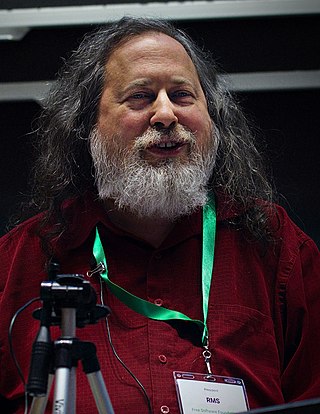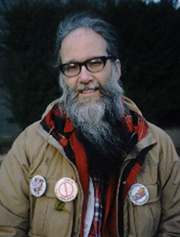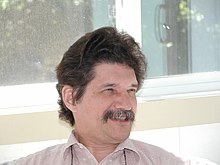
Free software, libre software, libreware or rarely known as freedom-respecting software is computer software distributed under terms that allow users to run the software for any purpose as well as to study, change, and distribute it and any adapted versions. Free software is a matter of liberty, not price; all users are legally free to do what they want with their copies of a free software regardless of how much is paid to obtain the program. Computer programs are deemed "free" if they give end-users ultimate control over the software and, subsequently, over their devices.
The free software movement is a social movement with the goal of obtaining and guaranteeing certain freedoms for software users, namely the freedoms to run, study, modify, and share copies of software. Software which meets these requirements, The Four Essential Freedoms of Free Software, is termed free software.
The Free Software Definition written by Richard Stallman and published by the Free Software Foundation (FSF), defines free software as being software that ensures that the users have freedom in using, studying, sharing and modifying that software. The term "free" is used in the sense of "free speech," not of "free of charge." The earliest-known publication of the definition was in the February 1986 edition of the now-discontinued GNU's Bulletin publication by the FSF. The canonical source for the document is in the philosophy section of the GNU Project website. As of April 2008, it is published in 39 languages. The FSF publishes a list of licences that meet this definition.

GNU is an extensive collection of free software, which can be used as an operating system or can be used in parts with other operating systems. The use of the completed GNU tools led to the family of operating systems popularly known as Linux. Most of GNU is licensed under the GNU Project's own General Public License (GPL).

The GNU Lesser General Public License (LGPL) is a free-software license published by the Free Software Foundation (FSF). The license allows developers and companies to use and integrate a software component released under the LGPL into their own software without being required by the terms of a strong copyleft license to release the source code of their own components. However, any developer who modifies an LGPL-covered component is required to make their modified version available under the same LGPL license. For proprietary software, code under the LGPL is usually used in the form of a shared library, so that there is a clear separation between the proprietary and LGPL components. The LGPL is primarily used for software libraries, although it is also used by some stand-alone applications.

XEmacs is a graphical- and console-based text editor which runs on almost any Unix-like operating system as well as Microsoft Windows. XEmacs is a fork, based on a version of GNU Emacs from the late 1980s. Any user can download, use, and modify XEmacs as free software available under the GNU General Public License version 2 or any later version.
Gosling Emacs is a discontinued Emacs implementation written in 1981 by James Gosling in C.

The GNU Project is a free software, mass collaboration project announced by Richard Stallman on September 27, 1983. Its goal is to give computer users freedom and control in their use of their computers and computing devices by collaboratively developing and publishing software that gives everyone the rights to freely run the software, copy and distribute it, study it, and modify it. GNU software grants these rights in its license.

Texinfo is a typesetting syntax used for generating documentation in both on-line and printed form with a single source file. It is implemented by a computer program released as free software of the same name, created and made available by the GNU Project from the Free Software Foundation.

The GNU/Linux naming controversy is a controversy regarding whether computer operating systems that use GNU software and the Linux kernel should be referred to as "GNU/Linux" or "Linux" systems.

The Free Software Foundation (FSF) grants two annual awards. Since 1998, FSF has granted the award for Advancement of Free Software and since 2005, also the Free Software Award for Projects of Social Benefit.

Richard Matthew Stallman, also known by his initials, rms, is an American free software movement activist and programmer. He campaigns for software to be distributed in such a manner that its users have the freedom to use, study, distribute, and modify that software. Software that ensures these freedoms is termed free software. Stallman launched the GNU Project, founded the Free Software Foundation (FSF) in October 1985, developed the GNU Compiler Collection and GNU Emacs, and wrote all versions of the GNU General Public License.

Leonard "Len" H. Tower Jr. is a free software activist and one of the founding board members of the Free Software Foundation, where he contributed to the initial releases of gcc and GNU diff. He left the Free Software Foundation in 1997.

GNU Emacs is a free software text editor. It was created by GNU Project founder Richard Stallman, based on the Emacs editor developed for Unix operating systems. GNU Emacs has been a central component of the GNU project and a flagship project of the free software movement. Its tag line is "the extensible self-documenting text editor."
Emacs, originally named EMACS, is a family of text editors that are characterized by their extensibility. The manual for the most widely used variant, GNU Emacs, describes it as "the extensible, customizable, self-documenting, real-time display editor". Development of the first Emacs began in the mid-1970s, and work on GNU Emacs, directly descended from the original, is ongoing; its latest version is 29.4, released June 2024.

Copyleft is the legal technique of granting certain freedoms over copies of copyrighted works with the requirement that the same rights be preserved in derivative works. In this sense, freedoms refers to the use of the work for any purpose, and the ability to modify, copy, share, and redistribute the work, with or without a fee. Licenses which implement copyleft can be used to maintain copyright conditions for works ranging from computer software, to documents, art, and scientific discoveries, and similar approaches have even been applied to certain patents.

The GNU General Public License is a series of widely used free software licenses, or copyleft, that guarantee end users the four freedoms to run, study, share, and modify the software. The license was the first copyleft for general use and was originally written by Richard Stallman, the founder of the Free Software Foundation (FSF), for the GNU Project. The license grants the recipients of a computer program the rights of the Free Software Definition. The licenses in the GPL series are all copyleft licenses, which means that any derivative work must be distributed under the same or equivalent license terms. It is more restrictive than the Lesser General Public License and even further distinct from the more widely-used permissive software licenses such as BSD, MIT, and Apache.

The GNU Free Documentation License is a copyleft license for free documentation, designed by the Free Software Foundation (FSF) for the GNU Project. It is similar to the GNU General Public License, giving readers the rights to copy, redistribute, and modify a work and requires all copies and derivatives to be available under the same license. Copies may also be sold commercially, but, if produced in larger quantities, the original document or source code must be made available to the work's recipient.
The Free Software Foundation (FSF) is a 501(c)(3) non-profit organization founded by Richard Stallman on October 4, 1985, to support the free software movement, with the organization's preference for software being distributed under copyleft terms, such as with its own GNU General Public License. The FSF was incorporated in Boston, Massachusetts, United States, where it is also based.

Free Software, Free Society: Selected Essays of Richard M. Stallman is a collection of writings by Richard Stallman. It introduces the subject of history and development of the GNU Project and the Free Software Foundation, explains the author's philosophical position on the Free Software movement, deals with the topics of software ethics, copyright and patent laws, as well as business practices in application to computer software. The author proposes Free software licenses as a solution to social issues created by proprietary software and described in essays.














